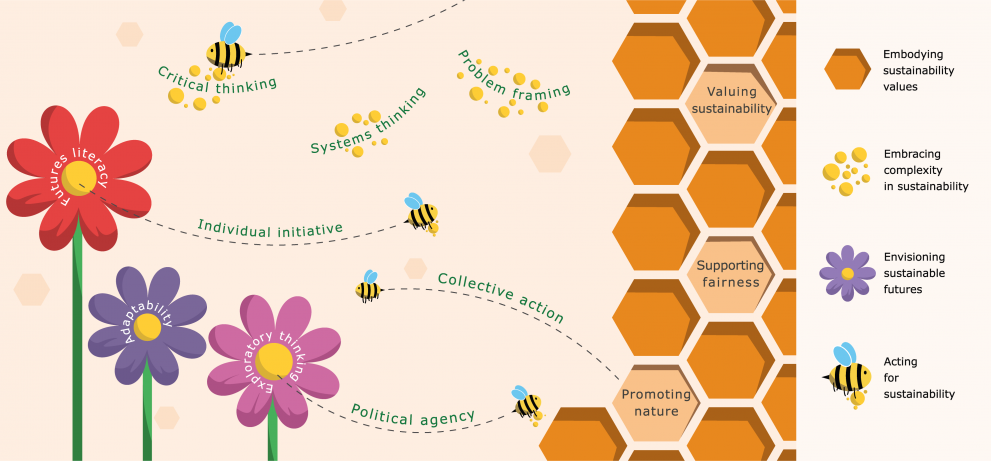GreenComp consists of 12 competences organised into the four areas below:
Embodying sustainability values, including the competences
- Valuing sustainability: To reflect on personal values; identify and explain how values vary among people and over time, while critically evaluating how they align with sustainability values.
- Supporting fairness: To support equity and justice for current and future generations and learn from previous generations for sustainability.
- Promoting nature: To acknowledge that humans are part of nature; and to respect the needs and rights of other species and of nature itself in order to restore and regenerate healthy and resilient ecosystems.
Embracing complexity in sustainability, including the competences
- Systems thinking: To approach a sustainability problem from all sides; to consider time, space and context in order to understand how elements interact within and between systems.
- Critical thinking: To assess information and arguments, identify assumptions, challenge the status quo, and reflect on how personal, social and cultural backgrounds influence thinking and conclusions.
- Problem framing: To formulate current or potential challenges as a sustainability problem in terms of difficulty, people involved, time and geographical scope, in order to identify suitable approaches to anticipating and preventing problems, and to mitigating and adapting to already existing problems.
Envisioning sustainable futures, including the competences
- Futures literacy: To envision alternative sustainable futures by imagining and developing alternative scenarios and identifying the steps needed to achieve a preferred sustainable future
- Adaptability: To manage transitions and challenges in complex sustainability situations and make decisions related to the future in the face of uncertainty, ambiguity and risk
- Exploratory thinking: To adopt a relational way of thinking by exploring and linking different disciplines, using creativity and experimentation with novel ideas or methods
Acting for sustainability, including the competences
- Political agency: To navigate the political system, identify political responsibility and accountability for unsustainable behaviour, and demand effective policies for sustainability
- Collective action: To act for change in collaboration with others
- Individual initiative: To identify own potential for sustainability and to actively contribute to improving prospects for the community and the planet

The four competence areas are tightly interrelated: sustainability as a competence encompasses all four taken together.
The 12 sustainability competences are also interrelated and interconnected, and should be treated as parts of a whole.
While we encourage learners to acquire the 12 competences, they do not need to acquire the highest level of proficiency in all 12, nor have the same proficiency across all of them. Indeed, GreenComp implies that sustainability as a competence is made of 12 building blocks.
Related Content
JRC report: GreenComp. The European sustainability competence framework.
DigComp: The Digital Competence Framework for citizens
EntreComp: The Entrepreneurship Competence Framework
LifeComp: The European framework for the personal, social and learning to learn key competence
